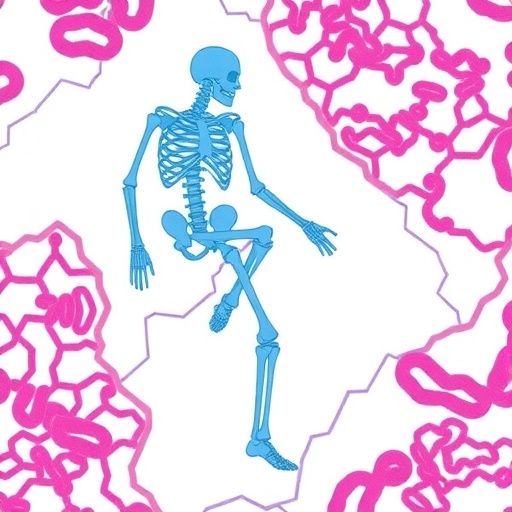Recent research has uncovered a striking relationship between osteopontin derived from hypoxia-induced M2 macrophages and the progression of osteosarcoma, a type of bone cancer that disproportionately affects adolescents and young adults. The study, spearheaded by prominent researchers Xing, Hu, and Zhao, investigates the intricate signaling pathways involved in this cancer progression. This discovery offers potential new avenues for therapeutic intervention, shedding light on the roles of immune cell signaling in cancer contexts.
Osteopontin (OPN) is a glycoprotein that serves various functions in the human body, influencing cellular processes such as adhesion, migration, and proliferation. In the context of cancer, particularly osteosarcoma, OPN has been shown to facilitate tumor growth and metastasis. This research posits that OPN released by hypoxia-induced M2 macrophages significantly enhances cancer cell advancement, highlighting the dynamic interaction between immune cells and tumor progression.
Hypoxia, a condition characterized by reduced oxygen availability, is critical to the tumor microenvironment. In tumors, hypoxic conditions promote a shift in macrophage polarization towards the M2 phenotype. M2 macrophages are traditionally associated with tissue repair and anti-inflammatory responses. However, this study reveals that when exposed to hypoxia, these macrophages adopt a pro-tumorigenic role by producing osteopontin. Understanding this switch in behavior is crucial for developing targeted treatments against osteosarcoma.
The researchers specifically explored the mechanisms through which osteopontin modulates cancer progression. One of the pivotal findings is the involvement of EGR3, a zinc-finger transcription factor. EGR3 is known for its role in regulating various genes involved in cellular growth and differentiation. The study outlines how osteopontin signals through EGR3 to enhance the expression of ISG15, a protein associated with various aspects of cellular stress responses and immune regulation.
Another vital player in this signaling pathway is RIG-I, a pattern recognition receptor involved in the antiviral immune response. The interaction between osteopontin and RIG-I illustrates the complex signaling network existing between tumor cells and the immune system. RIG-I’s modulation by osteopontin could potentially alter the tumor’s immune landscape, facilitating a more aggressive tumor behavior, as indicated by the research findings.
Furthermore, the study emphasizes the significance of understanding the tumor microenvironment in cancer progression. The intricate relationship between macrophages and tumor cells unveils opportunities for therapeutic intervention at multiple points in the disease process. By targeting the OPN-EGR3-ISG15-RIG-I signaling axis, new therapeutic strategies could be designed that might improve patient outcomes in sarely needed contexts like osteosarcoma.
The implications of this research extend beyond osteosarcoma, as osteopontin’s role in other cancers, including breast and prostate cancer, has been previously established. This raises the question of whether similar signaling mechanisms exist in those tumors, thereby making OPN a potential target across a broader spectrum of malignancies.
Clinical applications of these findings may take the form of biomarkers for early detection or novel therapeutic agents that inhibit osteopontin or disrupt its signaling pathway. Consequently, this study does not merely advance our understanding of osteosarcoma but also signals a shift towards more personalized therapeutic approaches in oncology.
The potential for therapeutic innovations based on these findings highlights the necessity for ongoing research. Further investigations could lead to the identification of additional molecular targets within the OPN signaling cascade, each presenting novel opportunities for intervention. The research community must build on these results, as they hold the promise of establishing more effective treatment protocols tailored to individuals with osteosarcoma.
Additionally, the study opens doors to exploring how metabolic changes in the tumor microenvironment, prompted by hypoxia, can be manipulated to shape macrophage behavior and subsequently the progression of cancer. It invites further inquiry into the precise conditions that promote M2 macrophage differentiation and activation in various cancers, making it pivotal for drug development.
Ultimately, the work of Xing, Hu, and Zhao serves as a compelling call to action within the scientific and medical communities. By emphasizing the interplay between the immune system and tumor biology, this research not only enhances our understanding of osteosarcoma but encourages a holistic approach to cancer treatment that incorporates insights from immunology and cell signaling.
In conclusion, the connection between osteopontin secreted by M2 macrophages and osteosarcoma progression delineates a critical pathway that warrants thorough exploration. It acts as a reminder of the complexities inherent in cancer biology, and the necessity for interdisciplinary collaboration to devise novel therapeutic strategies that could significantly enhance patient outcomes in the ongoing battle against cancer.
Subject of Research: Osteopontin derived from hypoxia-induced M2 macrophages in osteosarcoma progression.
Article Title: Osteopontin derived from hypoxia-induced M2 macrophages promotes osteosarcoma progression through modulation of EGR3/ISG15 signaling and RIG-I expression.
Article References:
Xing, C., Hu, W. & Zhao, L. Osteopontin derived from hypoxia-induced M2 macrophages promotes osteosarcoma progression through modulation of EGR3/ISG15 signaling and RIG-I expression.
J Transl Med 23, 950 (2025). https://doi.org/10.1186/s12967-025-06936-y
Image Credits: AI Generated
DOI: 10.1186/s12967-025-06936-y
Keywords: Osteopontin, M2 macrophages, osteosarcoma, hypoxia, EGR3, ISG15, RIG-I, cancer progression, immune signaling.
Tags: adolescent bone cancer researchhypoxia-induced M2 macrophages in cancerhypoxic tumor microenvironment effectsimmune cell signaling in tumorsimmune response and cancer therapymacrophage polarization and tumor growthosteopontin and osteosarcoma relationshiposteopontin as a cancer biomarkerosteosarcoma progression factorspro-tumorigenic macrophage functionsrole of glycoproteins in cancertherapeutic interventions for bone cancer





